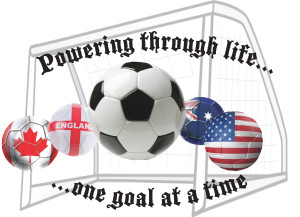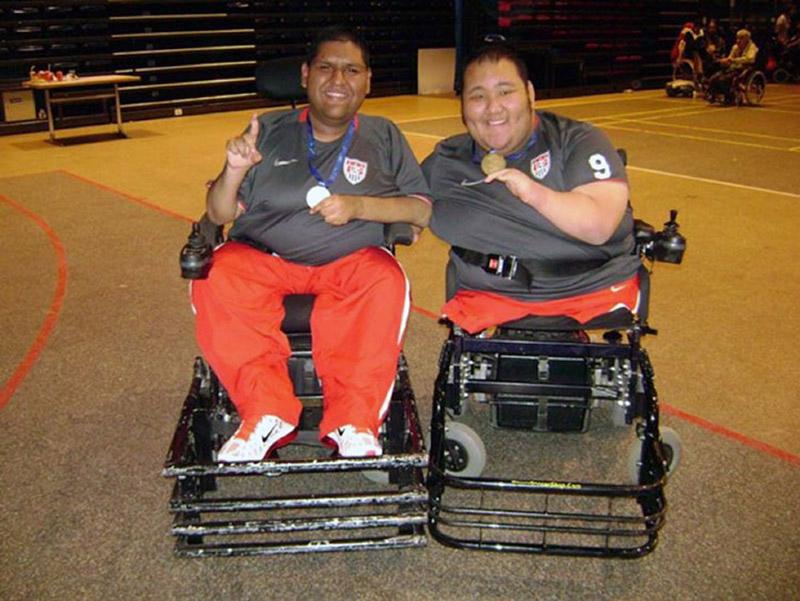Powering through
UW-Eau Claire student set to take national stage with power soccer team once again
Teammate Omar Solorio poses for a photo with Winslow after winning the 2011 world cup in Paris, France.
November 5, 2014
Three years ago, UW-Eau Claire student Pete Winslow sat in a packed gym of nearly 1,000 fans in Paris, France, listening to the national anthem after his power soccer team won the gold in the 2011 World Cup.
Now, the junior broadcast journalism student has begun to prepare himself for what he hopes could be another championship run, but this time with much more notoriety.
Winslow is a congenital amputee, which means he was born without a limb or a part of a limb, and was also adopted by a Minnesota family at a young age. Growing up, Winslow fell in love with sports and music, and he took these two passions to college with him.

Phillip Ostrander, associate professor of music, said Winslow is a special student.
“Pete is what we call a glue student just because of who he is inside,” Ostrander said. “He is able to bring others together as a collaborative type of student and bring the mood up.”
Winslow first got involved with power soccer eight years ago when he visited the Courage Center, a place for people with disabilities near his home with his father.
“I remember they were having an expo for different activities such as soccer, swimming and basketball,” he said. “I ran into the sports and rec coordinator, and she basically told me ‘you have to try this,’ and I literally fell in love with it right there and then.”
Winslow said power soccer may seem confusing at first, but it really isn’t too different from normal soccer.
The sport consists of four players on a normal-size basketball court at a time. One goalie, one left wing, one right wing and one center. Offsides rules don’t apply in power soccer, as the game comes with a few of its own unique rules.
The two-on-one rule states two players can’t guard one single player, which speeds up the game and allows better passing. The three-in-a-box rule states the three court players can’t be in the goalie’s box because it wouldn’t allow offensive players to shoot on goal proficiently. Lastly, the 20-inch rule doesn’t allow players to pass or shoot the ball above 20 inches from the ground.
Winslow also said the power chairs they use in games are different from everyday power chairs.
The chairs are custom made with an object on the front used to strike the ball, which resembles a cow catcher. They are also specially programmed to max out at 6.2 miles per hour, which is the game’s speed limit. If the limit isn’t followed, the team may have to forfeit the match.
“Think of the game chairs as the sports car and our everyday chairs as the luxury cadillac,” he said. “They are completely different.”
Winslow, who was selected to the 2015 national team last month, said training has already begun, but at a slow pace.
“Every week, we are emailed new drills by our coaches that we do daily and report back to our team,” he said. “Then starting in January, we will start our first of four training camps, which consist each of three 12-hour days doing drills at different locations.”
The U.S. team has won the first two World Cups they competed in; first in 2007 and later 2011. This makes the 2015 Cup a chance for a milestone three-peat, which has never been done before in the sport.
However, Winslow said the 2015 tournament won’t get any easier for the team as it will expand to a 15 team field from the 10 team field in the 2011 tournament.
“It’s really exciting seeing how the sport has grown in just a matter of years,” he said. “The field is up to 15 teams now showing just how much it’s grown and become a better sport over the years.”
Winslow said power soccer started out quickly in France and Europe. The sport in the U.S. started out slowly because of play with a giant
ball and rules slowing the game down. The United Nations of Soccer got together to discuss rules and got the U.S. involved in the faster-paced game.
“I’ve asked old athletes about the former game, and they said they had no idea the game would evolve into what it has today,” he said. “Because if you looked at the game in it’s beginning compared to now in it’s prime it looks like two different things.”
Although the winning and notoriety that comes with putting on the U.S. jersey is great, Winslow said there is a lot more to it all for him than just winning.
During the summer, he works at the Courage Center Camp as a counselor and leader, not only helping children, but also teaching them the game of power soccer.
“Last summer was a special one for me and one I’ll never forget,” Winslow said. “During my time as a Courage Camp counselor, I was able to take a camper under my wing and make an impression while teaching her the sport I love.”
Chad Wilson, one of Winslow’s teammates, said he not only sees Pete’s passion for the game but also what it brings to him when he’s not competing.
“Soccer has given Pete an opportunity to find joy in the success of others,” Wilson said. “The way his face lights up when his instruction helps a young player score shows how soccer has helped make him a great young man.”
Despite a fair portion of Winslow’s time being filled up with his soccer commitment, he is also a part of the student-run television station TV 10’s weekly sports program and a part of the campus jazz band and trombone choir.
Ostrander said Winslow is one of those students who makes you forget what the program is like without him.
“If you went to one of Pete’s concerts blindfolded, you wouldn’t notice any differences in his music,” Ostrander said. “Pete has done amazing things to adapt himself to the trombone with his disabilities and it’s truly amazing to see his success.”
Although the World Cup isn’t until 2015, preparations have begun for Winslow and his team in order to prepare themselves.
Winslow said the site of the upcoming World Cup isn’t set in stone yet, but it has been narrowed down to either Canada or Australia.
“This next year’s World Cup unfortunately will not take place in the U.S. like we had previously thought,” Winslow said. “Despite this, we are hoping to gain more national coverage from stations such as ESPN to finally put us on the map.”

